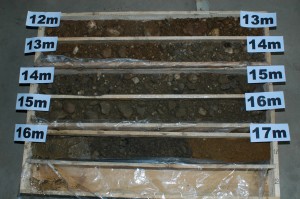Our subsoil department provides all the important services for you in the context of construction soil investigation and foundation advice – from pre-investigations, through to the drawing up of construction soil analyses, managing construction activities and the acceptance of foundation works.
In order to avoid nasty surprises at a later date, you should ensure that you receive a Construction Soil Expert Opinion before you purchase property for construction. The example that everyone likes to use is the “Leaning Tower of Pisa.” Even during the construction, it was noted that the tower leaned to one side. If the load capacity of the subsoil had been determined beforehand using a subsoil analysis, and the relevant preventive actions had been taken, it would have been be standing straight today. A subsoil analysis serves to estimate and minimise the risks involved in a construction project. Furthermore, the subsoil analysis enables comprehensive planning and precise cost calculations to be undertaken.
The properties of the subsoil are particularly important for building a foundation for a building. Load-bearing capacity is the ability of the subsoil to support loads from the building without substantial settlement or a base failure occurring. Often, the subsoil is composed of various soil layers and types of soil; the groundwater can also influence load-bearing capacity. Before beginning construction, the soil must therefore be sufficiently investigated as part of a subsoil inspection to determine its suitability as a soil to be built upon.
Subsoil: Our services
- Subsoil inspection
A subsoil inspection investigates the soil areas which are significant to erecting a building. The construction soil inspection includes investigating the soil or the rock, including all components such as groundwater (and contamination if present) on which the building will be built or embedded. (DIN 4020, Section 3.1[1]).
- Drill core sampling
Drill core sampling takes soil samples and creates a layer index to determine the exact properties of the soils.
- Soil analysis
Soil analysis uses various methods and procedures to determine soil parameters, such as nutrients and humus contents, occurrence of pollutants, soil organisms, properties of the water and air content, pressure sensitivity as well as the physical composition (particle size distribution).
- Proctor compaction test
The Proctor compaction test is a laboratory method of experimentally determining the optimal moisture content at which a given soil type will become most dense and achieve its maximum dry density.
In contrast to populary formulations, it is not the highest density a given soil type can take on.
- Plate load pressure test
The plate load pressure test is a test to determine pressure resistance and load-bearing capacity of soils and materials. It is used for earthworks, soil engineering and road-building as evidence of the suitability of soils and sub-soils (rubble layers) as construction soil as per DIN 1054. Ram testing is used for greater test depths.
A significant assumption for planning and construction of the trenches or foundation is knowledge of the existing subsoil. To this end, a subsoil inspection and soil analysis is conducted; its type and scope depends upon the difficulty of the construction process and the expected subsoil conditions.
Using the results of the inspection, a foundation concept is developed which contains indications and key values for establishing the dimensioning of the foundation. The goal of these recommendations is to ensure the safety of the foundation and its usefulness to the greatest degree, as well as to optimise the commercial aspects of the foundation activities.
In addition to geological maps, geotechnical procedures provide conclusions about local construction soil contents (drilling, probing and test excavations)
DO YOU HAVE QUESTIONS ABOUT SUBSOIL OR SOIL ENGINEERING?
Call us at:

